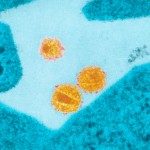Lien vers Pubmed [PMID] – 19455014
AIDS 2009 Jun;23(10):1197-207
OBJECTIVES: CCR7, a chemokine receptor expressed at high levels on naive and central memory T cells, is essential for T-cell recirculation into secondary lymphoid organs. We investigated CCR7 expression and chemotactic function in patient T cells, to gain further insights into mechanisms of T-cell dysfunction in HIV infection.
DESIGN AND METHODS: CCR7 expression and function were measured in T-cell subsets of viremic patients (n = 15), efficiently treated patients (n = 12), and healthy blood donors (n = 14). A whole blood assay was developed to measure chemotaxis in unperturbed T cells with physiological chemokine receptor expression levels.
RESULTS: The proportion of CCR7hi T-cell subsets (naive and central memory) was decreased in HIV-infected patients, but the expression of CCR7 within T-cell subsets did not differ from that in healthy controls. In spite of preserved CCR7 expression, CCR7-dependent chemotactic responses were significantly decreased within most T-cell subsets from viremic patients, including naive, central memory, and effector memory CD4 T cells and naive, central memory, and effector CD8 T cells. The chemotaxis defect was only partially corrected in efficiently treated patients. Importantly, chemotaxis to CXCR4, another chemokine receptor involved in T-cell recirculation, was preserved or even increased in T-cell subsets of HIV-infected patients.
CONCLUSION: These findings provide evidence for an impairment of CCR7 function in patient T cells, which may have major consequences on T-cell recirculation. The fact that CXCR4 function was preserved points to a CCR7-specific functional defect rather than a general block in chemotaxis.

